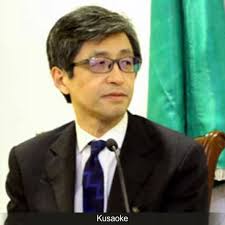“G7”, even though it is a closed prestigious club of the only 7 big economy nations, it is a tradition that some countries that are in the good books of the G7 nations are always invited to such meetings as observers and to rub minds with the aim of winning some favors. The May 2016 G7 meeting hosted by the Prime Minister of Japan Shinzo Abe at Ise-Shima, Tokyo was somewhat important to advocates of Universal Health Coverage (UHC) as the big 7 committed to support UHC. Prior to the meeting in March 2016 the Partnership for Maternal, Newborn and Child Health (PMNCH) led 192 organizations from 51 countries to sign a letter that was sent to Prime Minister Shinzo Abe. This writer was opportune to sign the letter.
The letter called on the G7 to priorities UHC as follows;
- Endorse the principles of universal health coverage. Make an explicit commitment to the Global Strategy for Women’s, Children’s and Adolescent’s Health by supporting Universal Health Coverage.
- Universal Health Coverage must leave no one behind. Call for Universal Health Coverage to support equity and rights by focusing on the most marginalized and vulnerable populations, delivering comprehensive sexual, reproductive, maternal, and newborn, child and adolescent primary health care services and ensuring services are provided free at point of use.
- Prevention is better than response. Support reform to the global health architecture with coherent proposals on health systems strengthening for UHC and health security.
- Increase aid to health. Call on G7 countries to contribute 0.1% of Gross National Income to health, as part of 0.7% to Official Development Assistance and, ensure that aid is aligned and supports national health systems.
The letter also called on the Prime Minister Abe to ensure the Ise-Shima G7 is a landmark summit that supports Universal Health Coverage so that sexual, reproductive, maternal, newborn, child and adolescent health services reach marginalized or vulnerable populations. The letter also made reference to the 2000 Okinawa Summit that took an ambitious and far-sighted decision to launch the Global Fund for Malaria, TB and HIV/AIDS and the 2010 G7 launched the Muskoka Initiative, both of which are the international community’s greatest successes in improving global health. It also emphasized that prioritizing Universal Health Coverage for the 2016 G7 meeting is a strategic choice given the adoption of the Sustainable Development Goals, which include universal access to sexual and reproductive health services and Universal Health Coverage, the Global Strategy for Women’s, Children’s and Adolescents’ Health and the pandemic outbreaks that have exposed the dangers of underfunded and understaffed health systems.
Iam glad that the signed letter has resonated well with the G7 leaders’ evidenced by the Ise-Shima Leaders’ 32 page Declaration of a Summit, 26-27 May 2016. I will only highlight few areas of the declaration worth sharing.
The G7 highlighted that health is the foundation of prosperity and security not only for individuals but also for nations. At the juncture of the first G7 summit after the historic adoption of the 2030 Agenda, the leaders fully committed to implementing the health-related Sustainable Development Goals (SDGs) therein that ensure well-being at all stages and health security for all individuals, and foster inclusive economic growth for nations.
With respect to the UHC, the leaders observed that attaining of UHC with strong health systems and better preparedness are needed and also they recognized the importance of accelerating achievement of UHC with the principle of no one left behind. “We reiterate our commitment to enhance our support and coordination to strengthen health systems, especially in developing countries, to make them more resilient, inclusive, affordable, sustainable, and equitable ones. To this end, we emphasize the need for a strengthened international framework to coordinate the efforts and expertise of all relevant stakeholders and various fora / initiatives at the international level, including disease-specific efforts. In this connection, we support the establishment of UHC 2030 that seeks to ensure the International Health Partnership (IHP+) principles and is supported by initiatives such as the Roadmap Healthy Systems, Healthy Lives.”
These are heavy words of commitment by the Big 7 which in months to come will lead to more proactive movement and mobilization of financial resources to support UHC. For the developing countries leaders that normally attend as observes, I call on them to play the role of catalysts and champions of UHC that support fulfilment of promises by the Big 7.
All comments to Dr Aminu Magashi Publisher Health Reporters (healthweekly@yahoo.com)




